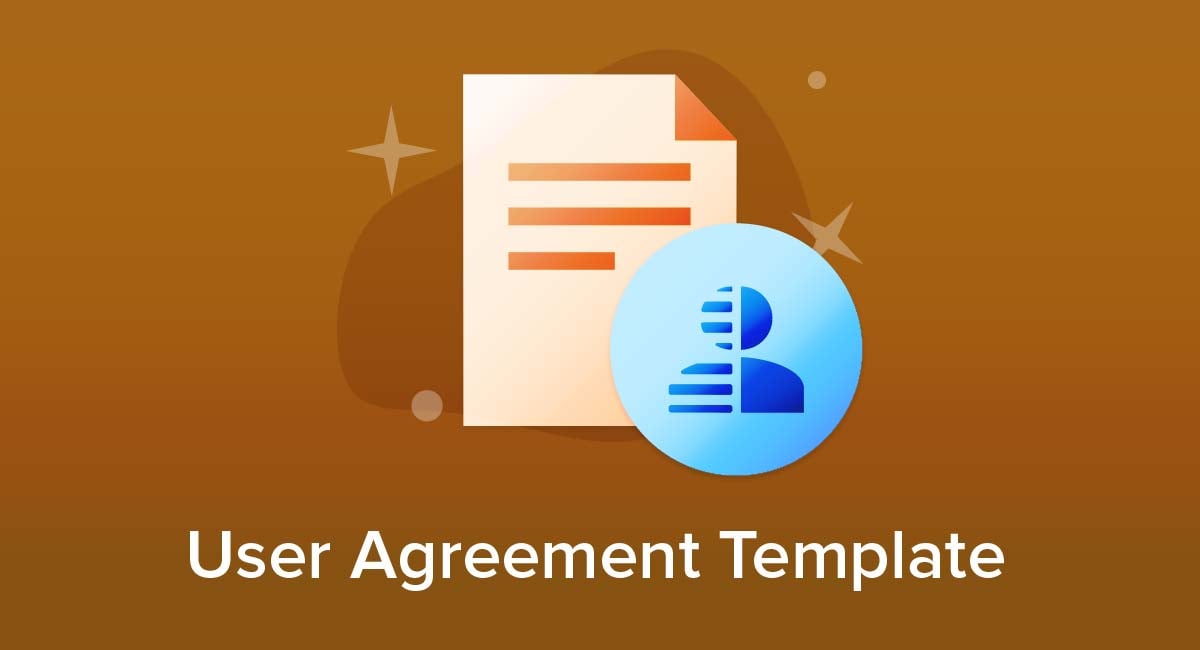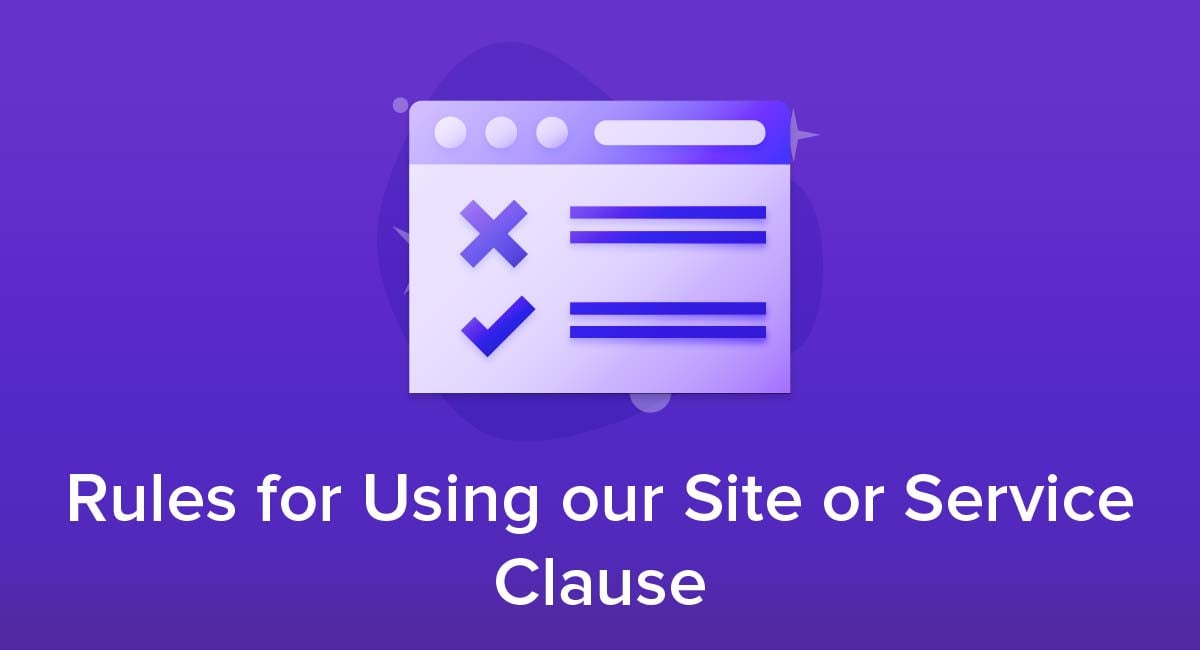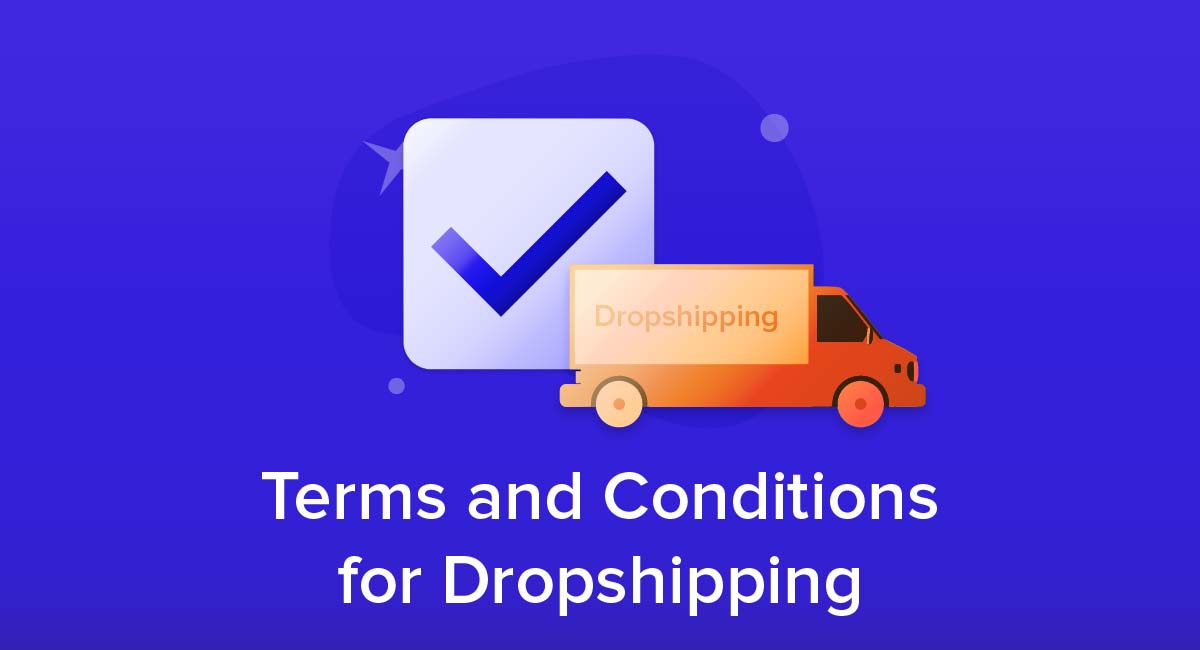
Having a Terms and Conditions agreement for your dropshipping store can help control and dictate the use of your site and protect it against potential misuse. This is an essential policy for all stores, but especially dropshippers because it can protect your company's future and brand when growing your business.
The article below contains some tips on what a Terms and Conditions agreement looks like and how you can draft one to fit your particular dropshipping store.
Our Free Terms and Conditions Generator is created to help you generate a professionally drafted agreement that can include various terms and conditions for your site and/or app.
- Start the Free Terms and Conditions Generator from our website.
- Select platforms where your Terms and Conditions will be used (website, app or both):
- Answer a few questions about your website or app information:
- Select the country:
- Answer a few questions about your business practices:
-
Enter your email address where you'd like to receive the new Free Terms and Conditions and click "Generate":
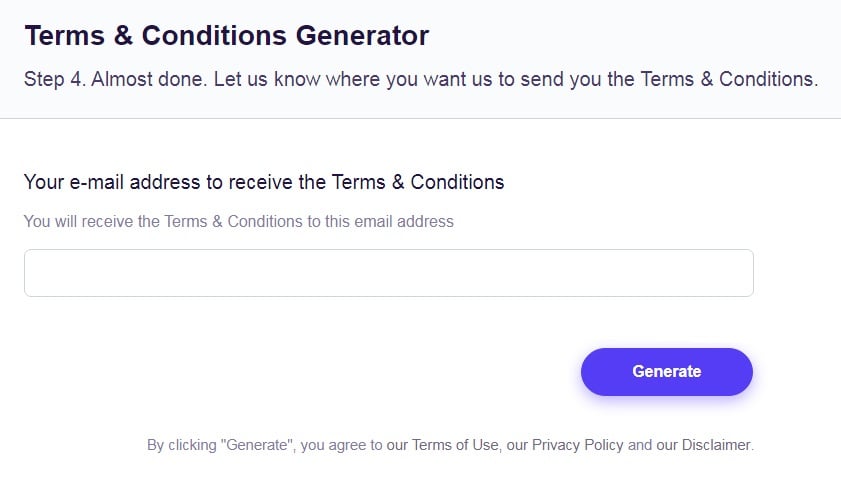
Once generated, you can copy and paste your Free Terms and Conditions agreement on your website or app or link to your hosted Free Terms and Conditions page.
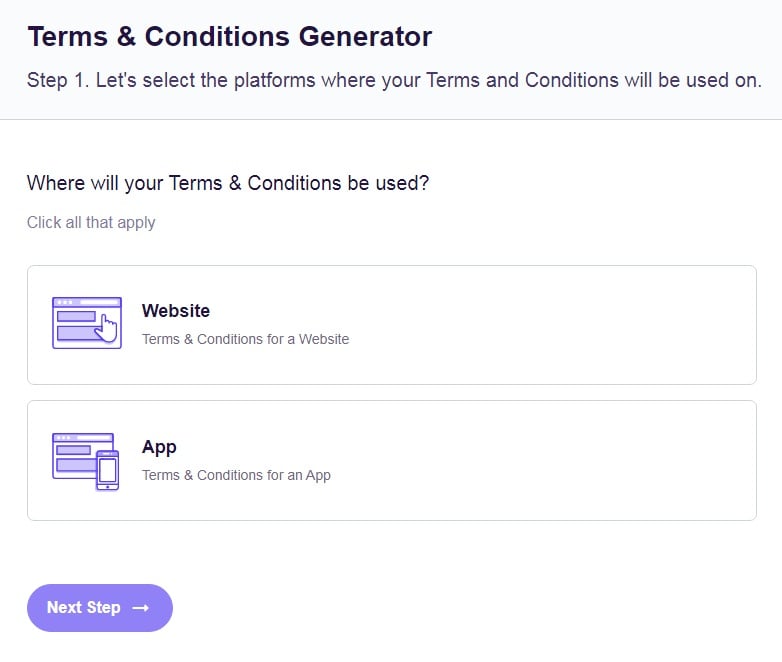
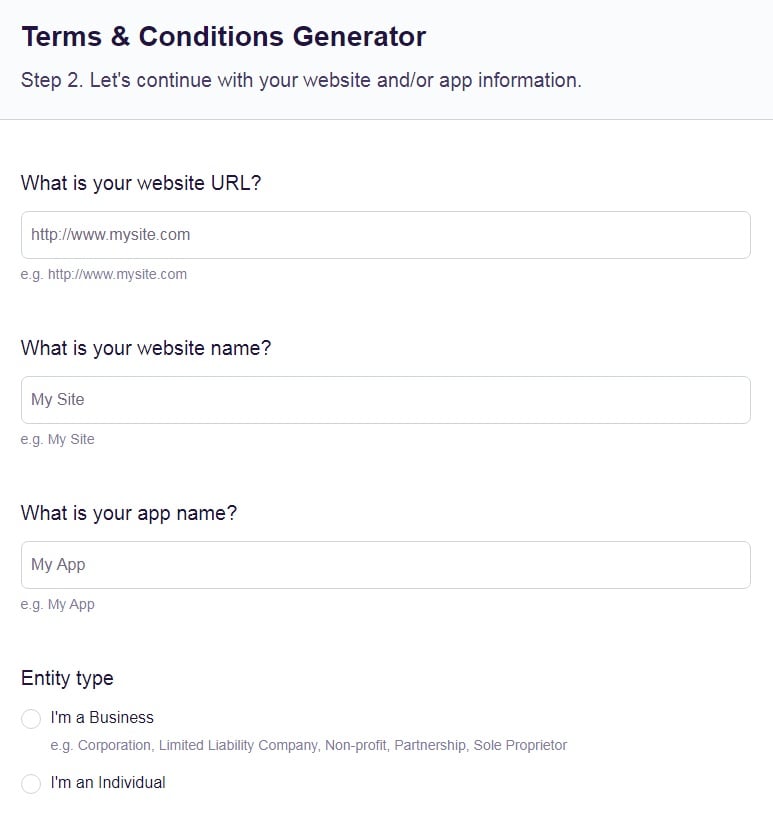
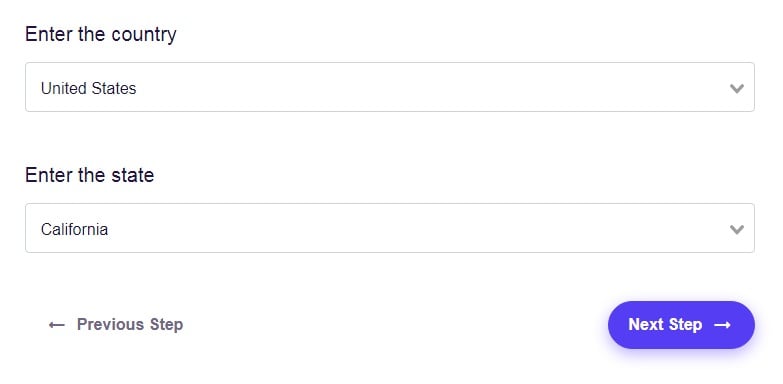
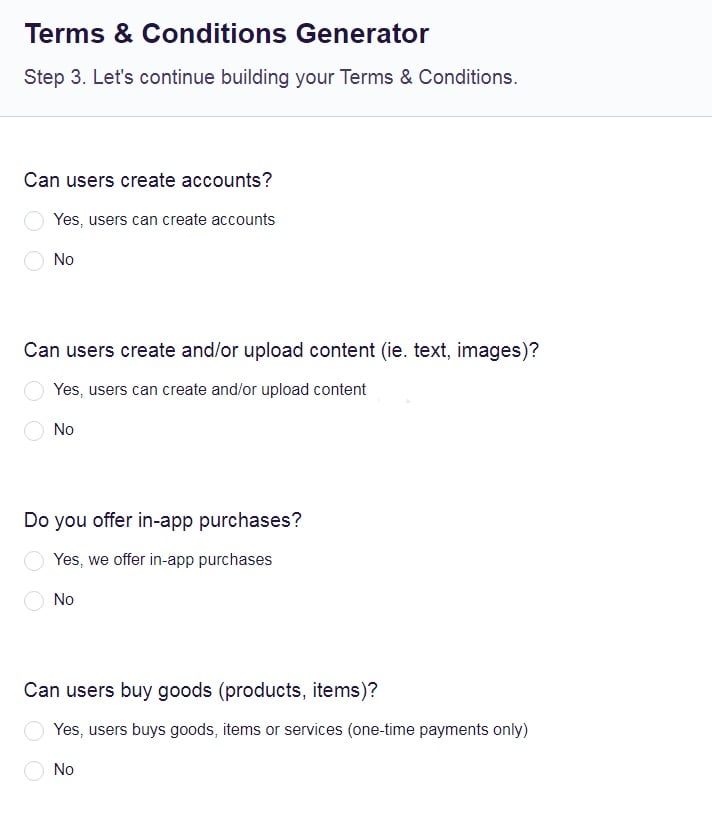
- 1. Terms and Conditions Agreement Facts
- 2. Why a Terms and Conditions Agreement is Important for Dropshippers
- 3. Important Clauses to Include in Your Terms & Conditions Agreement for Dropshipping
- 3.1. Introduction
- 3.2. Prohibited Uses
- 3.3. Termination of Use
- 3.4. Intellectual Property
- 3.5. Payment Processing Information
- 3.6. Disclaimer of Warranties
- 3.7. Limitation of Liabilities
- 3.8. Modification of Terms
- 4. Where to Display Your Terms and Conditions Agreement for Dropshipping
- 5. Summary
Terms and Conditions Agreement Facts
Unlike a Privacy Policy, a Terms and Conditions or a Terms of Use agreement is not legally required. It is, however, highly recommended to include one on your site, particularly for ecommerce stores.
A Terms and Conditions agreement states your website's terms, regulations, and rules for how users can interact and use the site. This can include warranties, prohibited use of the site, and what laws govern the agreement.
When a consumer agrees to your terms, and the agreement itself, a legally binding contract is formed between your business and the user. If a user violates the terms, it can mean termination of the usage or potentially give rise to a legal matter.
Why a Terms and Conditions Agreement is Important for Dropshippers

A Terms and Conditions agreement can benefit your company, along with your consumers, in a number of ways.
The benefits to your business can include:
- Control over the use of your site - A Terms and Conditions agreement allows you to control how users can use your website, whether that is while they are on it or how they use your brand. You are able to prohibit certain types of disruptive or abusive conduct, which can potentially protect your site.
- Termination of accounts or usage - Since a user agrees to the terms, this creates a legally binding agreement. If a user violates it, you can include in your terms you have the right to cancel or prohibit their use.
- Limit your liabilities - One of the major benefits of a Terms and Conditions agreement is that you can limit your liabilities to consumers. Stating in your Terms and Conditions agreement the limitations of your site's liabilities for third-party products can potentially protect you if an issue arises. It can also help you inform users of what your actual liabilities are and what the liabilities are of the third party.
- Protect your intellectual property - Not often thought of but extremely important is that your terms can protect your intellectual property rights in the brand and logo of your dropshipping business. As an entrepreneur, protecting your brand can be beneficial for your business's future.
As mentioned above, a Terms and Conditions agreement also benefits users as well. this agreement notifies users of what they can and can't do in regard to your dropshipping store. Transparency about what the relationship is between your site and consumers is very important to users because it can build trust and goodwill with them.
Important Clauses to Include in Your Terms & Conditions Agreement for Dropshipping

As this agreement is not legally required, there are no required clauses to include in your Terms and Conditions. It is often left up to each individual company to determine what clauses are the most beneficial for their company and the products they provide. For a dropshipping site, you may not need clauses other ecommerce stores or websites include.
Whatever you include in your Terms and Conditions agreement, remember to keep your language clear and simple. Complex Terms and Conditions can confuse the user. It's best to keep your terms understandable as this will help users and protect your company if there is a dispute over your terms.
Let's take a look at a few clauses you should consider including in your Terms and Conditions agreement.
Introduction
It may be simple and obvious, but many Terms and Conditions agreement include an opening statement to the user about what the agreement is and what terms are contained in it. Consumers may not know what a Terms and Conditions agreement is, so it's best to offer a simple explanation.
Additionally, this is where you can state that by agreeing to the terms, a legally binding agreement is created.
Here's how Faire does this:
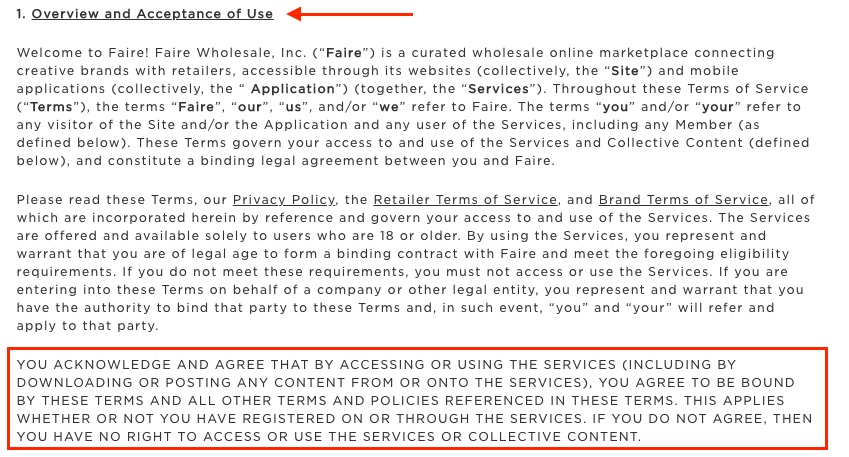
Prohibited Uses
The main point of your Terms and Conditions agreement is this clause. It is where you state what the prohibited uses of your website are. This can include how users may actually use the website, and what they must not do.
Boulevard Apparel does this in a short statement:

Here's how Faire has created this clause in a way that's more indepth and detailed:
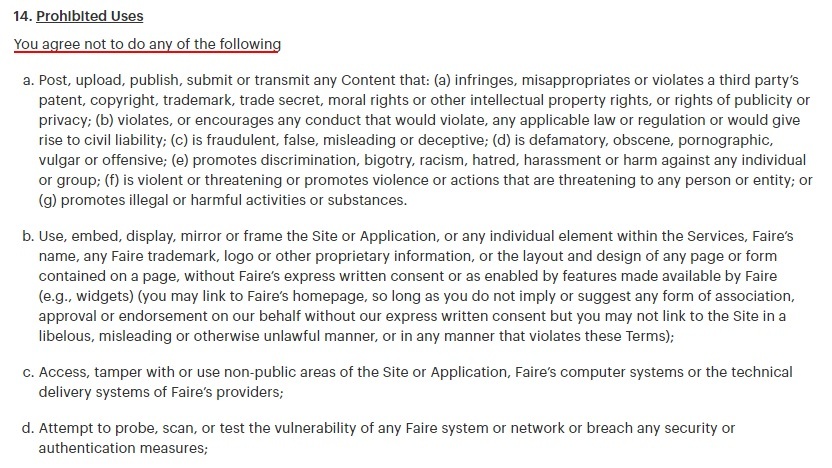
Termination of Use
A Terms and Conditions agreement allows you to control the use of your site. It is also where you can state your company's rights if a user violates the agreement. A Termination of Use clause is where you notify users of what may potentially occur if they violate your terms. It can be halting their account for a certain amount of time or even terminating their use, depending on the misuse.
You can also address what happens if a customer terminates his own account.
Here's an example, again from Faire:

Intellectual Property
Intellectual property, such as trademarks and copyrights, are extremely important to the expansion of a business.
If you are just starting out, protecting your brand can be essential in the long run and help bring in customers. Including a clause in your Terms and Conditions agreement helps protect those rights in your intellectual property from misuse of your name and logo.
SaleHoo protects its intellectual property with this short but effective statement.

Payment Processing Information
Consumers will need to know how they can pay for your products. Stating how they may make purchases, whether it is by credit card or an online banking system, is important for your website.
Here's how Urban Outfitters lets shoppers know what forms of payment they can use:

Disclaimer of Warranties
A very common and important clause that should go in your Dropshipping Terms and Conditions agreement is a Disclaimer of Warranties clause. This is where you can state what you do or do not warrant to your customers. In other words, what do you promise or do not promise to your customers in relation to the use of your site and the products you sell.
A common phrase to include in this section is that customers take the site "as is" or "as available." This means customers are using the site as it is, including any issues or bugs that may come with the site.
Here's an example of such a clause from Dog Pawty's Terms of Service:

Limitation of Liabilities
Often combined with the Disclaimer of Warranties information, the Limitation of Liabilities clause states what your liabilities are to the consumer and if there are any limitations of those liabilities.
Including this section can protect your website if a consumer is injured from a product you sell or if something occurs during the use of your website.
Dropshippers may want to include what your store is actually liable for, and what the third-party company is liable for. Users may be confused about who potentially is liable to them.
A Limitation of Liabilities section can be short, but it may be a good idea to be specific about the limitation of your liabilities to better protect your company. Here's an example from Faire:
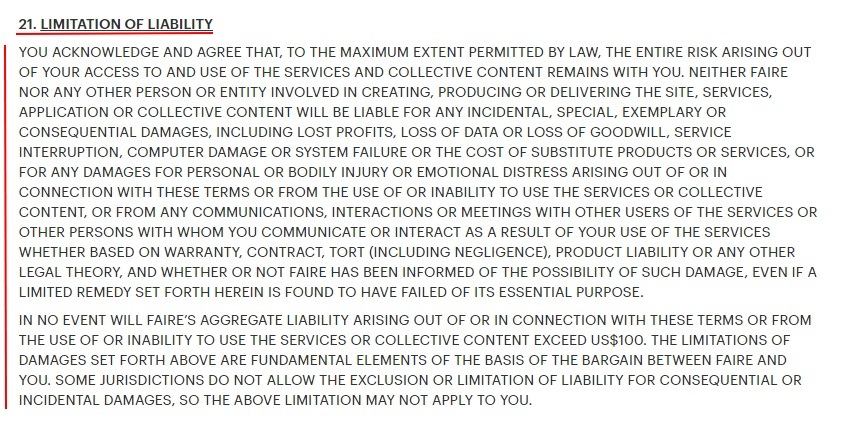
Governing Law
If legal issues do arise, including a section about what law governs the terms can be very important. Even though a Terms and Conditions agreement is not required, courts have looked differently upon the enforceability of a Terms and Conditions agreement. What law applies could play a role in any future litigation or disputes.
Here's an example from Urban Outfitters:

Modification of Terms
Your Terms and Conditions agreement may potentially change as your company grows or your products or services change. Users need to be notified of these changes.
Include a section notifying users that the terms may potentially change and that you have the right to modify the terms, as Faire states in its Terms and Conditions agreement:

Those are the main clauses you should consider including in your Dropshipping Terms and Conditions agreement.
Where to Display Your Terms and Conditions Agreement for Dropshipping

A link to your Terms and Conditions agreement should be somewhere that is easy to noticeable. Don't make users go looking for your Terms and Conditions agreement in a side page or hidden within other policies. Having it easily available benefits you and your consumers.
A common place to add a link to this agreement is in the footer of your website. Most ecommerce stores include links to their legal policies or essential pages in their footer and a consumer knows to look there first.
Here's how Wayfair does this:

If you have a mobile app for your dropshipping store, you will want to include a link in your app menu and the settings in the app store.
You can also include links at sign-up pages or check-out pages. It's a good idea to remind users before they sign up or purchase that there are terms that apply to their use of your store.
Katydid is a good example of how to do this:
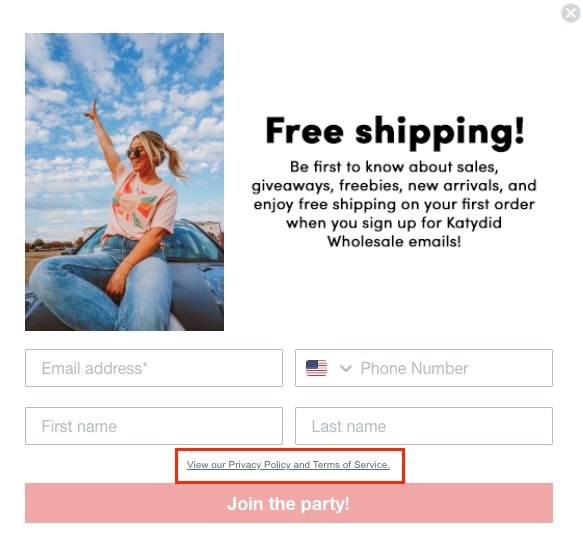
Some stores also include links to their Terms and Conditions agreements in their Privacy Policies or Return Policies. This is not as common, but notifies users that there are additional policies they should be aware of when they use your site.
Summary
Your Terms and Conditions agreement is an opportunity to put users on notice of the prohibited uses of your website and state your terms.
Your Terms and Conditions agreement should be written to fit your dropshipping company. Tailor it to your products and where you are located. Keep it simple and easy to understand, and make sure that a customer knows where to find a link to your Terms and Conditions agreement.
Remember, it isn't legally required, but can be very beneficial in protecting your site from misuse, if issues arise from using your site, or if a product you sell is defective.
